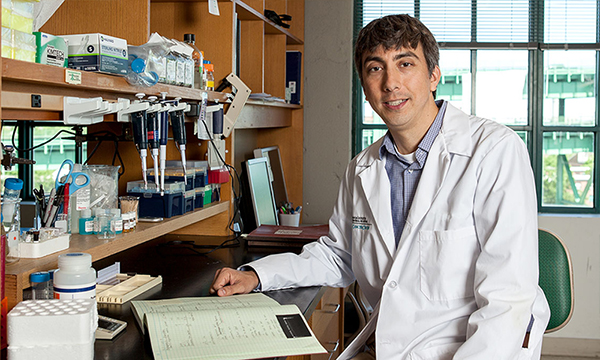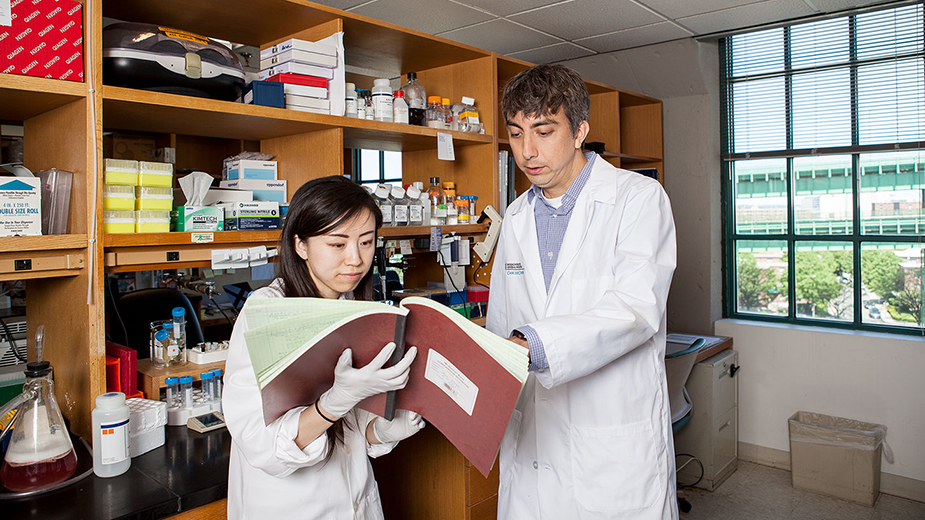Research Summary
The research goal of the Hata laboratory is to advance the development of novel targeted and immunotherapy approaches to benefit patients with lung cancer. Our focus is on understanding biological mechanisms that dictate drug sensitivity and resistance in oncogene-addicted lung cancers (those with activating genetic alterations EGFR, ALK, KRAS, etc.). Our approach is highly translational, integrating assessment of clinical specimens with generation and analysis of patient-derived cell culture and mouse tumor xenograft (PDX) models, performed in close collaboration with clinicians in the MGH Thoracic Oncology group. We have discovered clinical mechanisms of acquired drug resistance and identified therapeutic strategies to overcome them. Our work has also shed light on how cancer cells adapt and evolve during the course of therapy and we are currently working to identify targetable vulnerabilities in residual drug tolerant cancer cells that can be exploited to pre-empt the emergence of drug resistance. Our ultimate goal is to translate our laboratory discoveries into clinical trials testing novel therapeutic approaches.
Research Projects
Mechanisms of acquired drug resistance to targeted therapies
Lung cancers that harbor activating EGFR mutations and ALK fusions are exquisitely sensitive to small molecule EGFR and ALK tyrosine kinase inhibitors, respectively. However, even though most patients experience dramatic responses, drug resistance invariably develops leading to disease relapse. Similar patterns of sensitivity and acquired resistance are also observed in other subsets of oncogene- addicted lung cancers treated with molecularly targeted therapies (e.g. ROS1 fusions, RET fusions, BRAF mutations, MET exon 14 skipping mutations). In collaboration with oncologists in the Mass General Center for Thoracic Cancers, we have identified acquired secondary mutations and other genomic alterations that cause drug resistance in the tumors and blood of patients progressing after initial response to targeted therapies. To functionally interrogate mechanisms of drug resistance, we have developed a robust infrastructure for generating patient- derived cell lines and mouse patient-derived xenograft (PDX) models from lung cancer patients treated with targeted therapies at the Mass General Brigham Cancer Institute. These models have enabled functional screens to identify novel mechanisms of acquired resistance and testing of novel next-generation therapies to overcome them.
Targeting KRAS mutant lung cancers
Mutant-selective KRAS inhibitors have recently entered the clinic, however responses are seen in only a minority of patients. Work by our group revealed that many KRAS mutant lung cancers exhibit decreased oncogenic dependency and a dampened apoptotic response that contributes to intrinsic resistance to KRAS targeted therapy. To overcome this limitation, we are exploring novel therapeutic combinations that can modify these mechanisms and increase sensitivity to KRAS inhibitors. In addition, we are focused on understanding how both inter-patient and intratumoral heterogeneity may influence initial drug response and clonal evolution, leading to the development of acquired drug resistance.
Tumor adaptation and evolution during treatment
Despite the development of successive generations of targeted therapies with improved selectivity and potency, acquired resistance inevitably develops. Our discovery that drug tolerant clones that survive initial therapy can acquire a “second genomic hit” enabling outgrowth of fully resistant clones suggests that these persister cells may comprise a cellular reservoir from which heterogeneous mechanisms of resistance may arise. We have identified that targeted therapies can induce expression of the cytidine deaminase APOBEC3A, which increases genomic instability and accelerates the development of drug resistance. Ongoing efforts are focused on characterizing persistent tumor cells in patients and experimental models to identify additional mechanisms that drive adaptation to drug, with the goal of to develop therapeutic strategies to preempt acquired drug resistance.
Impact of tumor microenvironment on drug response and resistance.
Non-cancer cells within the tumor microenvironment (TME), such fibroblasts and macrophages, can potentiate or attenuate drug response. We have uncovered a striking degree of complexity in functional interactions between cells in the TME that may contribute to heterogeneityof drug response in the clinic. By unraveling these mechanisms, we hope to develop orthogonal TME-centric therapeutic strategies to augment the effectiveness of currently approved targeted therapies.
Developing novel immunotherapy approaches for lung cancers with low mutation burden
EGFR mutant and ALK fusion lung cancers typically occur in never-smokers and consequently have low tumor mutation burden and poor response to currently approved immune checkpoint inhibitors. We are developing TCR cellular therapies and novel methods for reprograming tumor cell antigenicity to direct the immune system to recognize and fight EGFR and ALK lung cancers. Additionally, we are exploring methods for stimulating innate immune cells such as macrophages to attack cancer cells.
Publications
Selected Publications
Isozaki H^, Sakhtemani R, Abbasi A, Nikpour N, Stanzione M, Oh S, Langenbucher A, Monroe S, Su W, Cabanos HF, Siddiqui FM, Phan N, Jalili P, Timonina D, Bilton S, Gomez- Caraballo M, Archibald HL, Nangia V, Dionne K, Riley A, Lawlor M, Banwait MK, Cobb RG, Zou L, Dyson NJ, Ott CJ, Benes C, Getz G, Chan CS, Shaw AT, Gainor JF, Lin JJ, Sequist LV, Piotrowska Z, Yeap BY, Engelman JA, Lee JJ, Maruvka YE, Buisson R, Lawrence MS*^, Hata AN*^. Therapy induced APOBEC3A drives evolution of persistent cancer cells. Nature. 2023 Aug;620(7973):393-401.
Shiba-Ishii A†, Johnson TW†,… Lin JJ*, Yoda S*, Hata AN*. Analysis of lorlatinib analogs reveals a roadmap for targeting diverse compound resistsance mutations in ALK-positive lung cancer. Nature Cancer. 2022 Jun;3(6):710-722.
Noritaka T†, Lin JJ†, Li C†,…Hata AN*, Heist RS*, Corcoran RB*. Clinical acquired resistance to KRASG12C inhibition through a novel KRAS switch-II pocket mutation and polyclonal alterations converging on RASMAPK reactivation. Cancer Discov. 2021 Aug;11(8):1913-1922.
Dagogo-Jack I, Yoda S, Lennerz JK, Langenbucher A, Lin JJ, Rooney MM, Prutisto-Chang K, Oh A, Adams NA, Yeap BY, Chin E, Do A, Marble HD, Stevens SE, Digumarthy SR, Saxena A, Nagy RJ, Benes CH, Azzoli CG, Lawrence MS, Gainor JF, Shaw AT, Hata AN. MET Alterations Are a Recurring and Actionable Resistance Mechanism in ALK-Positive Lung Cancer. Clin Cancer Res. 2020 Jun 1;26(11):2535-2545.
Piotrowska Z*, Isozaki H*, … , Hata AN*, Sequist LV*. Landscape of acquired resistance to osimertinib in EGFR-mutant NSCLC and clinical validation of combined EGFR and RET inhibition with osimertinib and BLU- 667 for acquired RET fusion. Cancer Discovery. 2018 Dec;8(12):1529.
Nangia V, Siddiqui FM, Caenepeel S, … , Benes CH, Hughes PE, Hata AN. Exploiting MCL-1 dependency with combination MEK + MCL-1 inhibitors leads to induction of apoptosis and tumor regression in KRAS mutant non-small cell lung cancer. Cancer Discovery. 2018 Dec;8(12):1598-1613.
Yoda S, Lin JJ, …, Hata AN*, Shaw AT*. Sequential ALK Inhibitors Can Select for Lorlatinib-Resistant Compound ALK Mutations in ALK-Positive Lung Cancer. Cancer Discovery. 2018 Jun;8(6):714-729.
Hata AN, Niederst MJ, Archibald HL, Gomez-Caraballo M, Siddiqui FM, Mulvey HE, Maruvka YE, Ji F, Bhang HC, Radhakrishna VK, Siravegna G, Hu H, Raoof S, Lockerman E, Kalsy A, Lee D, Keating CL, Ruddy DA, Damon LJ, Crystal AS, Costa C, Piotrowska Z, Bardelli A, Iafrate AJ, Sadreyev RI, Stegmeier F, Getz G, Sequist LV, Faber AC, Engelman, JA. Tumor cells can follow distinct evolutionary paths to become resistant to epidermal growth factor receptor inhibition. Nature Medicine. 2016; 22:262-9.
†Co-first authors
*denotes equal contribution
^Co-corresponding authors
Research Image

Oncogene-addicted lung cancers can develop acquired drug resistance by selection of pre-existing resistant cells, or via evolution of drug tolerant persister cells that subsequently develop resistance mechanisms during the course of treatment. Therapeutic strategies that eliminate persisters or block their ability to evolve may preempt the development of acquired drug resistance.





